

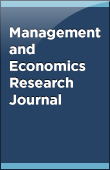
10.18639/MERJ.2022.9900065
Short Communication
Mar 15, 2022
In the past decade, India has shown tremendous economic growth patterns amid hue and cry over the economic disparities and imbalances. The Gross Domestic Product (GDP) growth rate has been impressive but other indicators of economic development such as infrastructure, income inequality, Index of Industrial Production (IIP) have been alarming and unsatisfactory. Recent structural changes in the Indian economy such as changes in FDI policy, Demonetisation, and implementation of Goods and Service Tax (GST) have witnessed contradictory patterns. This article focuses on the issues of India’s economic growth and the prevalent anomalies. It also captures the expectation of Modi’s government regarding the future of the Indian economy.
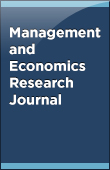
10.18639/MERJ.2022.9900063
Case Study
Mar 08, 2022
The COVID-19-induced lockdowns of 2020 caused millions of people to make greater use of social media platforms, including the TikTok mobile app. With over 800 million users globally and more than $1 billion in revenues in 2020, TikTok has emerged as a major player in the world of social media content. This case study explores how TikTok can improve its positioning as a mobile app for businesses and consumers. It also analyzes TikTok as a method of disruptive marketing. Additionally, this study evaluates how TikTok became a significant platform for social influencers. By serving its customers' needs for curated and concise video content, TikTok has created digital marketing opportunities, including branding, reach, sponsorships, and influencer capabilities. This study has significance for researchers and practitioners and broadens contemporary assumptions about strategic planning for social media platforms.
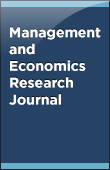
10.18639/MERJ.2022.9900051
Original Research Article
Jan 31, 2022
Special Issue S7: “Collegiality as a Management Practice”
This paper focuses on the impacts of water stress on health outcomes. It specifically investigates the health effects of insufficiency of water for sanitary needs in drought-affected households. A focus group discussion that drew medical experts from such fields as medicine, virology, and microbiology was conducted to collect data. The findings of the study show that there is a possibility of vulnerability to negative health outcomes such as Cholera, Diarrhea, and respiratory problems by households that lack the necessary levels of water for domestic, sanitation, and hygiene uses. It is therefore important that individuals and households susceptible to the vagaries of drought be aware of this relationship so that they may forge necessary adaptive measures such as the use of purifiers, hand and surface sanitizers, and disinfectants to mitigate the health effects of a drought that are related to inadequate water use for sanitary purposes.
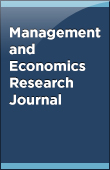
10.18639/MERJ.2021.9900059
Short Communication
Dec 31, 2021
The US-China Trade war followed by the global pandemic has reincarnated the diplomatic relations between countries. India-China relations have remained on a roller coaster ride with expectations for the unexpected future. India and China share a cooperative geo-political platform of BRICS and much needs to be assessed with India holding the chairmanship in 2021. The article touches upon the BRICS issues from the perspective of India-China relations as well as the expectations from the current regime. An attempt to decipher India’s stand on key issues such as pandemic cooperation, anti-terrorism, multilateral system reform et cetera is encapsulated in the article.
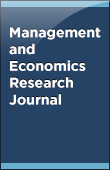
10.18639/MERJ.2021.9900058
Original Research Article
Dec 31, 2021
Climate change has emerged as one of the challenges of the global economy. Climate change economics has focused on the economic aspects of climate tradeoff. Studies have been conducted on the causal association of economic indicators and climate change indicators. However, for the sample of BRICS countries, that are important participants of global climate change, no study has attempted to identify whether causal connections apply to them. The study is an endeavor to identify the underlying causal connections between economic indicators and carbon emissions for BRICS economies. Six economic indicators, current account balance, inflation, foreign direct investment inflows, gross domestic product, real effective exchange rate, and trade openness, are selected for the sample period 2005–2019. Neural network analysis as a method of computational economics is applied for the superior methodology over standard statistical techniques. The outcome suggests that for BRICS economies, economic indicators have a significant relationship with carbon emissions, differing in intensity as per node strength of the neural network.
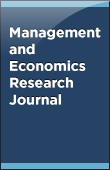
10.18639/MERJ.2021.1431686
Original Research Article
Dec 30, 2021
The current business environment has become very dynamic and this comes with threats and opportunities. Some of the factors that pose challenge in this environment are new entrants, loss of competitive advantage or rapid change of technology. In Kenya, SME suffer the same fate despite the critical role they play in the country. Most of the youth business startups fail at their third year and very few enterprises have grown into large formal organizations. To survive under this dynamic environment, entrepreneurial networking becomes an important strategy that can be adopted by organizations. The objective of this study was thus trying to examine influence of entrepreneurial networking strategic renewal on performance of youth owned SMEs. The specific objectives were membership of social network, professional networks, business networks and social networks and their influence on SMEs performance. The research design adopted was descriptive cross-sectional survey. The study targeted youth owned agro-processing SMEs registered by Ministry of Trade and Industry from four County Governments namely, Nyeri, Kirinyanga, Murang’a and Nyandarua. The population that constituted sampling frame was 287 youth owned enterprises. Quantitative data was collected by use of structured questionnaire. The overall model study was R Square= 0.092, meaning that Entrepreneurial Networking Strategies explained 9.2% of the variation on SMEs performance. The study coefficients indicated that holding all other factors constant, changing Entrepreneurial Networking strategies by one unit would result to a 0.324 change in Performance of Youth Owned Agro-processing SMEs. The value of t is 6.095, which was >2 and p-value of 0.000 which implied that there was statistically significant influence of Entrepreneurial Networking Strategies on performance. The study concluded that entrepreneurship networking influences performance of the youth owned agro-processing SMEs in Kenya. This study recommends there is need for the SMEs to further establish networks outside their business cycle.
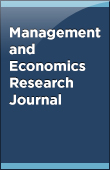
10.18639/MERJ.2021.1432975
Original Research Article
Dec 16, 2021
The foundation of this paper is built on the premise that foreign direct investment (FDI) follows economic growth and development as opposed to the narrative that argues otherwise. Considering that background, this paper pursued finding the direction of causality and the kind of relationship that exists between the two main variables of interest (FDI and Economic growth) using time series data spanning 1980–2018. Using the vector-autoregressive error correction mechanism and the autoregressive distributive lag, our paper found neither uni nor bidirectional causality between economic growth and FDI in South Africa. The findings support the notion that FDI follows growth and development as opposed to the current policy stance that seeks to attract more FDI without exhausting the potential carried by domestic firms in stimulating economic growth. The results from Granger causality tests, however, could not reject the null hypothesis of the causality that runs from unemployment to economic growth. The study found that unemployment in South Africa Granger causes economic growth significantly. Recommendations arising from our findings are that South African policymakers may need to consider paying more attention to inward-looking policies. More efforts if possible should be put toward making sure that domestic investment is stimulated through making it cheaper especially for small businesses to secure funding as well as making the investment environment small business-friendly to improve their success and contribution toward sustainable economic growth.
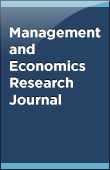
10.18639/MERJ.2021.1478488
Original Research Article
Nov 05, 2021
This study attempts to provide a general overview on the use of accounting information in Albania. An extensive use of accounting information by different stakeholders would be a testimony of the quality and reliability of accounting information, but the opposite would indicate otherwise calling for improvement in the area of financial reporting. Data are collected by means of a questionnaire. All respondents are certified accountants, members of the biggest and most prominent-certified accountants association in Albania. The questionnaire reveals that in general accounting, information is not heavily used neither by entities’ management nor by other users. Surprisingly, users of accounting information that are closest to the entity use it very little or not at all, raising big questions on the quality and trustworthiness of accounting information. The study is just an initial assessment of the perceived usefulness of accounting information in Albania. The questionnaire is addressed to certified accountants who answer on behalf of their client companies. The study investigates the usefulness of accounting information as perceived by various stakeholders in Albania. Even though this is a well-researched topic worldwide, to the knowledge of the authors there are no such studies in Albania.
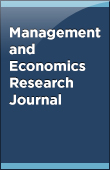
10.18639/MERJ.2021.9900040
Original Research Article
Oct 30, 2021
The soaring cases of coronavirus pandemic coupled with unpredictable climatic variations posed danger to human lives and food security. This work examined “Relationship between climate change and food security in sub-Saharan Africa.” Using the Generalized Method of Moments technique with preliminary diagnostic tests on panel data across the 17 sub-Sahara African countries, the dependent variable is agricultural output, while the independent variables are temperature, rainfall, government expenditure on agriculture, inflation, exchange rate, gross fixed capital formation, and labor force. The findings revealed that climate change exerts negative impact on food security through temperature variations which degenerated during the period under review. The results also showed positive significant impact on government expenditure which increased during the period. The work recommended that government should embark on massive productive investments to reinvigorate and re-engineer the economy. The government and appropriate agencies should also put in place hybrid technology of high yield crops adaptive to change in climate as well as effective mechanism for food storage to secure food for the future.
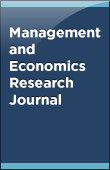
10.18639/MERJ.2021.1437137
Original Research Article
Sep 10, 2021
The purpose of the study was to determine the influence of VAT incentives on financial performance of manufacturing firms in Kenya. The study focused on all manufacturing companies registered under Kenya Association of Manufacturers. The null hypothesis of the study was that there is no statistically significance association between VAT incentives and financial performance of manufacturing companies in Kenya. Descriptive survey research design was adopted where a sample of 211 respondents was selected from a target population of 447 manufacturing firms using stratified random sampling technique. The study collected data for a period covering 10 years, which was from 2009 to 2018. The targeted respondents were the accountants and officers in senior management. The response rate on the questionnaires issued was 73.5%. Both descriptive and inferential data analysis was carried out. The data failed in the test of normality and so the study applied ordinal regression analysis for the determination of the model. The findings of the study revealed that VAT incentives had statistically significant influence on financial performance of manufacturing companies in Kenya; hence, null hypothesis was rejected at 0.05 level of significance. The study concluded that influence of VAT incentives leads to improvement in financial performance of manufacturing firms in Kenya. Hence, VAT incentives are key to financial performance of manufacturing companies. The study therefore recommended that the management of manufacturing companies should utilize VAT incentives that are offered by the government, and the government should review the VAT policy so as to widen the gap on VAT incentives.
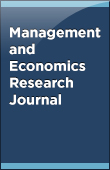
10.18639/MERJ.2021.9900042
Original Research Article
Aug 17, 2021
This study investigates the effect of crude oil price fluctuations on wheat, sugar, corn, and fertilizers. Results of Markov switching dynamic regression support evidence of two states. State 1, pertains to the low volatility of crude oil prices, and state 2, refers to higher volatility of crude oil prices. At state 1 higher levels of oil prices lead to a decline in food commodity prices, whereas in state 2, higher oil prices cause an increase in food commodity prices. Results of Dynamic Conditional Correlation (DCC) GARCH estimates indicate the coefficients of oil price levels are significant and positively associated with the conditional volatility of the four commodity prices, implying that fluctuations in global food commodity prices are not due to oil price volatility but due to the oil price levels attained at the extreme points.
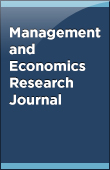
10.18639/MERJ.2021.9900043
Short Communication
Jul 30, 2021
Not applicable.
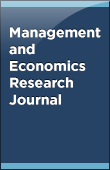
10.18639/MERJ.2021.9900044
Original Research Article
Jul 30, 2021
Nation Branding is imperative as nations compete in inviting inward investment, strengthening images, attracting talents, winning export markets, and garnering the trust of the population towards the ruling government. This study integrates the Resource-Based View (RBV) theory and Anholt’s hexagon model in order to examine the nation branding efforts in Kuwait from the perspectives of business communities. Quantitative analysis was performed to measure suitable variables for the Kuwait nation branding as a way of meeting the research objectives. The research is founded in the theoretical framework of the five main constructs namely Reputation Resources (investment, export, and tourism), Governance (power relation, region stability, and fair trade), Psychographic (attitude, cultural values, and behavior), Snowball sampling was carried out using the 210 usable data which were collected from businessmen from various cities of Kuwait. Partial Least Squares-Structural Equation Modeling (PLS-SEM) was utilized in analyzing the data. The results indicate a significant relationship between reputation resources and governance on branding performance with the mediation of the role of branding management. However, the psychographic aspects of the people which were hypothesized to influence the nation branding were found to be insignificant. The findings shed light on existing nation branding knowledge stock and provide valuable insights for the government in improving its Nation Branding Strategy.
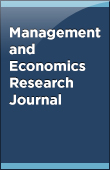
10.18639/MERJ.2021.9900036
Original Research Article
Jul 19, 2021
Import tax non-compliance is increasing in Malawi. A study was conducted to explore the perceptions of custom managers and agents towards import tax non-compliance with import tax procedures and processes. The design of the study was descriptive and used qualitative data collection and analysis methods. The study was conducted in Malawi’s major border posts of Blantyre and Mwanza in the southern region. A total number of 25 participants were purposively sampled and administered an open-ended data collection tool to collect data using in-depth face-to-face interviews. The qualitative data were analyzed using content analysis. Two themes emerged from the study which were, customs agents' limited knowledge, and corruption. The study results further show that training sessions by the Malawi Revenue Authority created the requisite knowledge to the customs agents which improved import tax compliance. However, corruption needs a long-term solution to change the stakeholders’ mindset. It is recommended that awareness should be created among the stakeholders to change the attitude and perceptions of the Malawian general public towards import tax non-compliance.
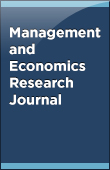
10.18639/MERJ.2021.1423084
Original Research Article
Jun 30, 2021
This article consists a review of the existing literature on artificial intelligence (AI) with respect to financial crimes. The purpose is to notify the unintentional bad impacts and intentional good impacts of AI applications in relation to financial crimes. This article has reinforced the discussions stating AI applications to be considered as a solution for financial crimes instead of being criticized as the cause for financial crime. The public and private sectors both need be alert with the unintentional harm caused by cybercrime. The current behavior of AI is considered as an accelerator or an antidote to financial crimes, specific to cybercrimes. It is advised to apply criminal law to control cybercrimes. However, holding the AI agents responsible is considered to be an inappropriate mechanism. Thus, AI systems are still not deemed to be capable of forming a proper legitimate system in order to curb the financial crimes.